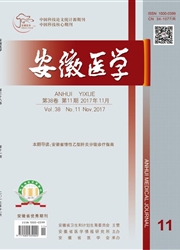

 中文摘要:
中文摘要:
目的探讨鳞状细胞相关抗原(SCCAg)、人类乳头状病毒分型检测(HPV)、液基细胞学检查(LCT)与宫颈上皮内瘤样变Ⅲ级(CINIH)患者宫颈锥切术后病理结果的相关性。方法回顾性分析105例CINIH患者的病例资料,比较宫颈锥切术后病理高危组和低危组患者的术前SCCAg、HPV分型检测、LCT检查结果。结果宫颈锥切术后病理高危组血清SCCAg值高于低危组,差异有统计学意义(P〈0.01);两组问HPV感染率和LCT阳性率比较,差异有统计学意义(P〈0.05)。结论SCCAg值、LCT结果、HPV分型检测联合应用对确定宫颈锥切术后病理级别有指导意义。
 英文摘要:
英文摘要:
Objective To investigate the correlation between the pathological results of the patients with cervical intraepithelial neo-plasia Ⅲ( CIN Ⅲ) after cold knife cervical conization and squamous cell carcinoma associated antigen( SCCAg) , human papilloma virus DNA genotype( HPV) , liquid-based cytology test ( LCT) . Methods A retrospective analysis of the clinical data was carried out in 105 cases with CIN Ⅲ. The pathological results after cold knife cervical conization were compared with preoperative SCCAg, HPV genotyping test, LCT be-tween high-risk group and low-risk group. Results The levels of SCCAg in high-risk group were significantly higher than those in low-risk group(P<0. 01). The positive rates of HPV infection and LCT in high-risk group and low-risk group were compared, and the difference be-tween the two groups was significant ( P<0. 05 ) . Conclusion The combined determination of SCCAg, HPV genotyping test and LCT is helpful in observing the pathological results after cold knife cervical conization.
 同期刊论文项目
同期刊论文项目
 同项目期刊论文
同项目期刊论文
 期刊信息
期刊信息
